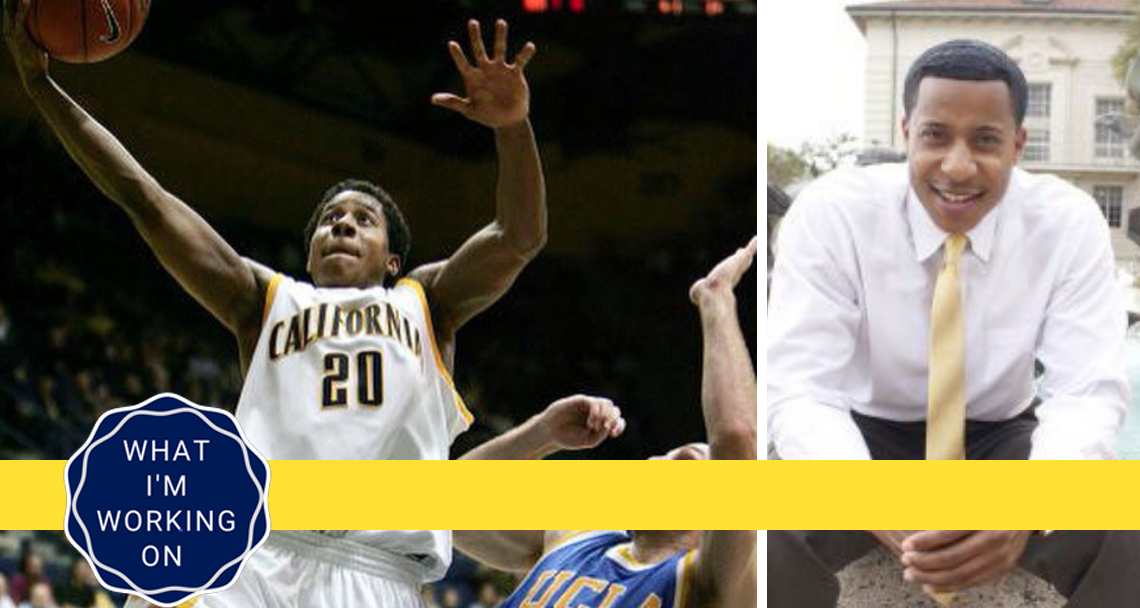What I'm Working On: Using Basketball to Promote Academic Achievement
Education Assistant Professor Martin Smith emphasizes 'an Afrocentric viewpoint of history'

Martin Paul Smith is an assistant professor of education. The son of late NBA All-Star Phil Smith and a former basketball player at the University of California at Berkeley, Smith has used basketball as a means to promote academic achievement, including through a camp named for his father. At Berkeley, he won the 2006 Jake Gimbell Award, which honors the student most committed to academic and athletic excellence.
Along with teaching in the Program in Education, Smith directs Duke’s Secondary Teacher Preparation Program and is the faculty director of the DukeEngage Boston Summer Literacy Program. He spoke recently with Duke Today about the classes he now teaches and how basketball has influenced his academic approach, among other things.
What are you working on now?
SMITH: I am finishing an article on how school tracking – the practice of separating students by academic ability into groups -- affects black men, analyzing the schooling experience of hip-hop megastar, Nasir “Nas” Jones. I wrote this piece with one of my Duke students and a former colleague.
What do you hope students learn in your course, “Race, Power and Identity: From Ali to Kaepernick?”
SMITH: My goal is for students to receive an Afrocentric viewpoint of history, ask the hard questions, and critically evaluate what they have been taught, but more importantly what they have not been taught. Without an Afrocentric perspective, American education is incomplete. John Henrik Clarke states, “History is not everything, but it is a starting point. History is a clock that people use to tell their political and cultural time of day. It is a compass they use to find themselves on the map of human geography. It tells them where they are, but more importantly, what they must be." Without an Afrocentric perspective, whether it be in K-12 schooling or at Duke University, students of all races are receiving an inadequate education.
What do you think is the most important lesson in your course, “Foundations of American Education?”
SMITH: That nearly every facet of the American educational system has been highly contested throughout history, yet students are often socialized to perceive American schooling as apolitical, objective and without bias.
“Society often views academic and athletic identities as mutually exclusive, specifically for black men. I find joy in demonstrating and highlighting that black men can operate in the highest realms of academia, as well as athletics.”
-- Martin Smith
How and why have you used basketball as a means to promote academic achievement?
SMITH: Right after matriculating at UC Berkeley, I worked in San Diego’s inner city, teaching geometry at Lincoln High School and adult education at San Diego Community College. I also coached high school basketball and ran my own basketball camps/clinics. At this juncture, I realized young people gravitated towards me because of my ability to play and teach the game of basketball. I view basketball as a means to an end, not an end in itself. Once I have young people’s attention, and we’ve built rapport through basketball, I use my platform to encourage them to pursue basketball vigorously, and to apply that same intensity to their academic endeavors.
I selected basketball as a medium to promote academic achievement because basketball taught me how to work hard, push past doubt, practice delayed gratification and overcome obstacles. Basketball also enabled me to travel the world and meet diverse people.
How has this fusion affected your work as an academic?
SMITH: I employ the same tenacity, dedication and work ethic from the basketball court to my work in academics. I research racial, academic and athletic identity, and I produce scholarly work that informs my interactions with young people and students. Society often views academic and athletic identities as mutually exclusive, specifically for black men. I find joy in demonstrating and highlighting that black men can operate in the highest realms of academia, as well as athletics.
You spent some time in South Africa, examining the effects of apartheid and American segregation on contemporary black, urban economic development. What did you take away from this experience and how has it affected you both personally and academically?
SMITH: It was a surreal and humbling experience. Apartheid ended in 1994, and the majority of Civil Rights’ acts were passed in the late 1960s, but in reality, the aforementioned changes did not solve racial problems or inequity in the USA or South Africa. I became hyper-aware of the interconnectedness of international human rights struggles and the fight against global white supremacy.
What was it like growing up with a father playing in the NBA?
SMITH: My dad was a unique guy. He had a colossal educational vision for all five of his children, which we all embraced and epitomized. He walked ever so quietly, but he carried a sledgehammer. He was very low-key. In one breath, it was very normal because he retired the year I was born so I didn’t really know him as an NBA player. He taught me how to play basketball, ride a bike, swim, do math, fish, drive a car, but he rarely, if ever, discussed his NBA accomplishments. However, everything he had accomplished affected his mentality. He raised me to be ambitious, determined, fearless, bold and inquisitive. He cared deeply about education, family and helping others. I learned a lot from watching how he navigated this world.